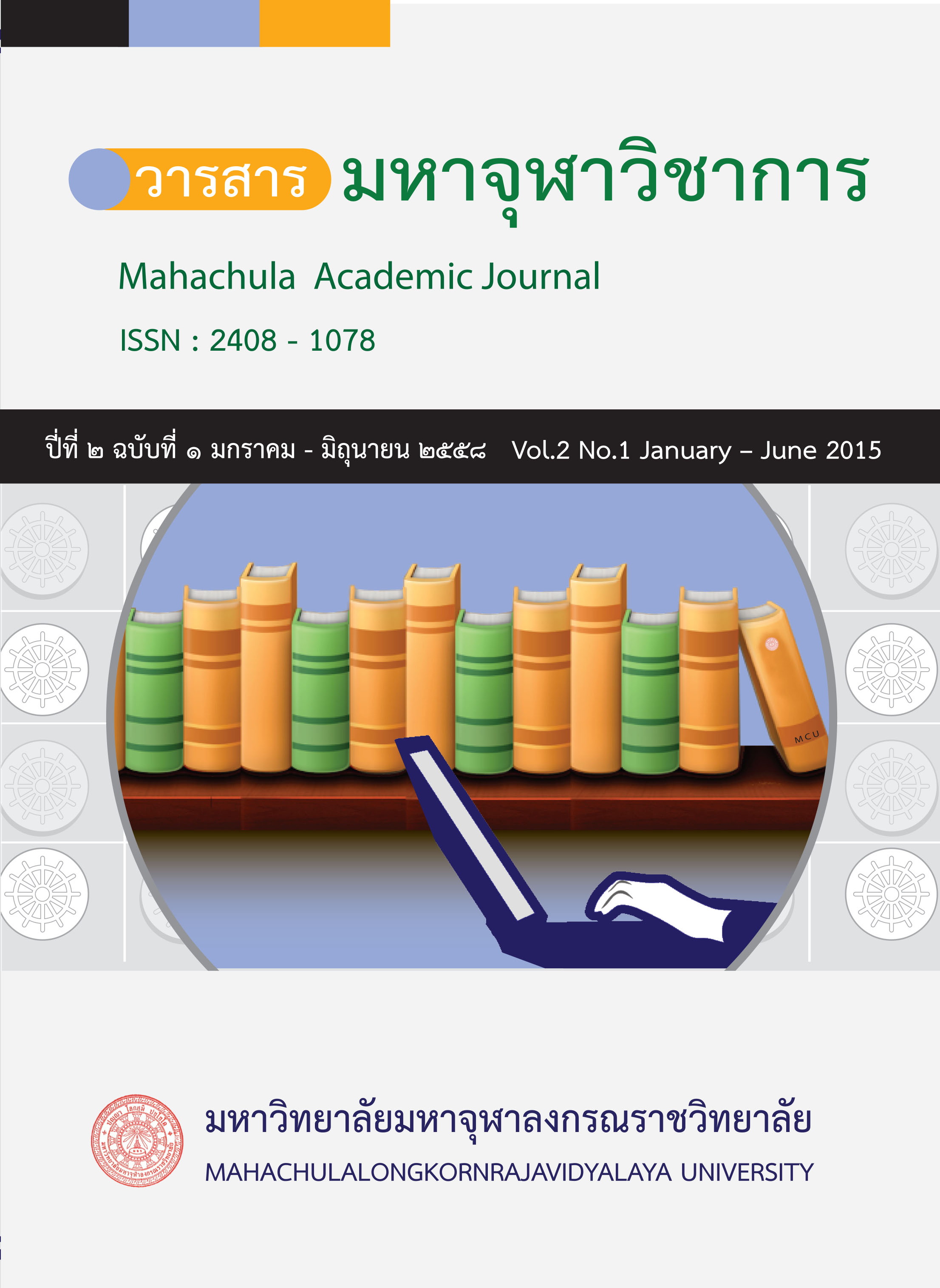Systems and Theories of Buddhist Psychology
Main Article Content
Abstract
A word “system” is the set of relation to things or dependence together on the staying things differently and independently. They are all applied in the type of integration in the meaning of the words “set” and “element” as well as they always relate to input, process, and output. The main system emphasizes the process meaning to the steps of work performance that are set clearly how we have done for taking the wanted results. They must be known generally, but not only the formations of documents, electronics or the other ways. Thai dictionary “Rajbundityastan” gave the meaning that the system is the order, type, and
formation including the different parts together such as the system of tree leaves is meant that they fell down and pressed on and on. The Buddhist psychology catches the elements of system to be direction for studying it. There are its objectives, framework, contents, hypothesis, major subject of development on study the Buddhist psychology, the main study from Buddha’s followers, the core of the Buddhist psychology, psychological development and application. All of them are integrated on relation from its objectives so that students have volunteer mind, love, and generosity by the principle of Sangahavatthu. Theory is meant
that the set of ideas is the reasons causing of studying systematically and with the purpose to explain the situation or appearance by getting the believable experience such as the theory of science etc. It is also meant that the thinking system can display the many appearances what they are, how they can happen and how they shall become in the future. It is the result from making the hypothesis and proves it by the science element so that we found the evidence and truth, the creditable and conforming reasons. It is accepted that this is the theory. According to the Buddhist psychology, it relates to Pali in the word “Titthi” that is translated “understanding” and “belief”.
In this study, it is meant to the right view depending on Dhamma or the right reasons. For instance, persons do the goodness, they take the good results. They do the badness, they take the bad results. Whole body is not permanent. True wisdom happens in Ariyasacca. Therefore, the Buddhist psychology is the educational system to emphasize the processes to say the its objectives, contents, morality as well as the students, who have learnt this subject, shall express the service mind to the public and the right view under the Buddhism’s moral principle.
Article Details
References
จิราภา เต็งไตรรัตน์ และคณะ. จิตวิทยาทั่วไป. กรุงเทพมหานคร : โรงพิมพ์มหาวิทยาลัยธรรมศาสตร์, ๒๕๕๒.
กิ่งแก้ว ทรัพย์พระวงค์. จิตวิทยาทั่วไป. กรุงเทพมหานคร : โรงพิมพ์มหาวิทยาลัยกรุงเทพ, ๒๕๔๓. คณาจารย์เลี่ยงเซี่ยง. พุทธประวัติฉบับมาตรฐาน. กรุงเทพมหานคร : โรงพิมพ์เลี่ยงเซี่ยง, ๒๕๔๗.
จำนง อดิวัฒนสิทธิ์. สังคมวิทยาตามแนวพุทธศาสตร์. สำนักงานอธิการบดี : มหาวิทยาลัยมหาจุฬาลงกรณราชวิทยาลัย, ๒๕๔๕.
พระธรรมปิฏก (ป.อ.ปยุตฺโต). พระไตรปิฎกสิ่งที่ชาวพุทธต้องรู้. กรุงเทพมหานคร : สำนักพิมพ์แมสโปรดักส์, ๒๕๔๖.
พิสิฐ เจริญสุข. คู่มืออบรมสมาธิ. กระทรวงศึกษาธิการ : กรมการศาสนา, ๒๕๕๒.
มหาวิทยาลัยมหาจุฬาลงกรณราชวิทยาลัย. พระไตรปิฎกภาษาบาลี ฉบับมหาจุฬาเตปิฏกํ ๒๕๐๐. กรุงเทพมหานคร : โรงพิมพ์รุ่งเรืองธรรม, โรงพิมพ์มหาจุฬาลงกรณราชวิทยาลัย, ๒๕๐๖-๒๕๓๒.
มหาวิทยาลัยมหาจุฬาลงกรณราชวิทยาลัย. พระไตรปิฎกภาษาไทย ฉบับมหาจุฬาลงกรณราชวิทยาลัย. กรุงเทพมหานคร : โรงพิมพ์มหาจุฬาลงกรณราชวิทยาลัย, ๒๕๓๙.
มหาวิทยาลัยมหาจุฬาลงกรณราชวิทยาลัย. อรรถกถาภาษาบาลี ฉบับมหาจุฬาอฏฺฐกถา. กรุงเทพมหานคร : โรงพิมพ์มหาจุฬาลงกรณราชวิทยาลัย โรงพิมพ์วิญญาณ, ๒๕๓๒-๒๕๓๔.
มหาวิทยาลัยมหาจุฬาลงกรณราชวิทยาลัย. อรรถกถาภาษาไทย ฉบับมหาจุฬาอรรถกถา. กรุงเทพมหานคร : โรงพิมพ์มหาจุฬาลงกรณราชวิทยาลัย,๒๕๕๕-๒๕๕๗.
มหาวิทยาลัยมหาจุฬาลงกรณราชวิทยาลัย. ฎีกาภาษาบาลี ฉบับมหาจุฬาฏีกา. กรุงเทพมหานคร : โรงพิมพ์มหาจุฬาลงกรณราชวิทยาลัย โรงพิมพ์วิญญาณ, ๒๕๕๔-๒๕๕๖.
วิทยากร เชียงกูล. จิตวิทยาและการพัฒนาตนเอง. กรุงเทพมหานคร : สำนักพิมพ์เดือนตุลา, ๒๕๕๒.
สมเด็จพระปรมานุชิตชิโนรส. พระปรมสมโพธิกถา (พิศดาร ๒๗ ปริเฉท). กรุงเทพมหานคร : โรงพิมพ์เลี่ยงเชียง, ม.ป.ป.


